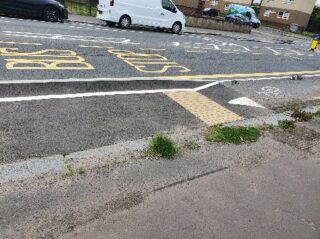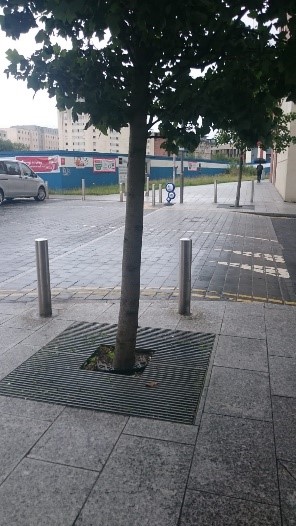With #COP26 on the horizon, Glasgow is preparing and poised to accelerate action towards the goals of the Paris Agreement and the UN Framework Convention on Climate Change. COP26’ first goal is to:
1. Secure global net zero by mid century and keep 1.5 degrees within reach
We firmly believe that a Just Transition to net zero in Scotland must include hearing the voices of disabled people in this debate, now. The alternative is retrofitting or potential legal challenges such as are going on in Edinburgh currently.
Drive to net zero

For us, the drive to ‘net zero’ is going at a faster pace than the drive to improve access needed for disabled people. For example, in Glasgow, the reduction in cars permitted to drive into the city centre, removal of disabled parking bays, inaccessible public transport, increased pedestrianisation, poor design of cycle lanes and crossing points, the lack of accessible charging points and the cost of electric cars all contribute to increased barriers to disabled people accessing their city. And it shouldn’t be a race between reaching net zero and realising rights of and for disabled people.

GDA has engaged and amplified disabled people’s views on Public Realm initiatives, in the hope that disabled people’s access to their own city will improve and examples include: The Avenues project, the redevelopment of George Square and Queen Street station.
The redevelopment of Sauchiehall Street in Glasgow had little or no involvement of disabled people and as a result has some serious failings – lack of safe segregation of pedestrians and cyclists, insufficient space between the road and bus stop entrances and lack of tactile markings for those with limited sight being just a few. This is the result of missing out the voices, experiences and solution focussed contributions of disabled people.
Spaces for (some) people
The Covid19 pandemic has meant that disabled people are far less visible due to shielding and being at home – and therefore easier to ignore when implementing changes to the public realm.
The ‘Spaces for People’ pandemic scheme had limited involvement of disabled people – after decisions were made – and despite reassurances at the time that all measures were temporary, only last week the majority of these were made permanent. This alarming news came on top of – again – little or no meaningful engagement or involvement from disabled people. It is clear that inaccessible consultations do not enable those most impacted by such policies to contribute their lived experience. We are seriously concerned that this decision is a gateway to further similar measures with no understanding of the impact on disabled people.
“I’ve had to give up on meeting friends twice in the past few weeks due to no parking being available in the city centre. It’s all been taken away for street cafes. On the third occasion I got a taxi – a return journey of £46. I just can’t afford that again, so it’s back to staying in for me!”
“As well as so much street furniture, there are now more and more bikes just being abandomed. As a visually impaired person this makes my commute dangerous and scary.”

GDA’s climate change conversations
“I’d love to take my children to Kelvingrove park, but the closure of Kelvin Way means there is no safe and accessible place for us to park the car and get into the park now. There’s been no consideration of people who can only walk short distances and need accessible toilets. ”
Disabled people care about their environment but our voices are not often heard and the debate rolls on unabated. This is unfortunate because sustainability and social justice are inextricably linked. Policies around climate action and sustainability need to work for everyone, and risk further widening inequality if disabled people’s voices are not part of the process from the beginning.
Glasgow Disability Alliance is supporting disabled people’s engagement in climate change initiatives, large and small. From the use of plastic straws to a UK initiative from the Motability Scheme about the transition to electric vehicles and disabled drivers access issues when it comes to charging. The scale of this problem is potentially immense, with Ricardo’s research with Motability estimating 1.35 million disabled drivers or passengers being partially or wholly reliant on inadequately designed public charging infrastructure by 2035.
Recently, GDA members worked with Glasgow Science Centre to design a programme of climate focussed events. Marianne Scobie, our Deputy CEO spoke at the festival’s Climate Cafe about the need to consider disabled people in conversations and decisions about environmental policy.
GDA is also highlighting the connections between social care and climate change – something often missed from key discussions. Lack of social care can result in disabled people relying on ready meals, pre-prepared food, incontinence products and more single use plastics than they otherwise wish to be using.We will have a special e-bulletin in the coming months – so watch this space!
After the Pandemic
Lateral North’s After the Pandemic, will be a creative and cultural hub for Glasgow in the run up to & during COP26. GDA will be delivering a series of fun, thought-provoking, inclusive events at the hub to highlight disabled people’s concerns about the environment, the impact ill-thought-out measures have on disabled people and suggest creative alternatives that take account of our needs.
So, lots to do! If you are a disabled person and interested in contributing your voice to any of the initiatives above, please do get in touch.
If you are an elected member, planner, architect or engineer, we’d love to hear from you and discuss how we can support you to engage and support disabled people to contribute to public realm policy and design.
Related Articles
We are Recruiting!
Policy and Participation Coordinator: New Vacancy on the GDA team! GDA’s Future Visions project has been supporting disabled people of Glasgow to play a leading…
Read More
Update: GDA’s Resilience Response to COVID19 outbreak
April 20th, 2020 Within four weeks of lockdown, GDA has: sent letters to our 5000+ members twice have phoned 2031 members to check their well being spoken to…
Read MoreGDA Learning Bulletin February – April 2020
Read about our learning opportunities for members in our Learning Bulletin which is now available to download. It contains all the details of our learning…
Read More



